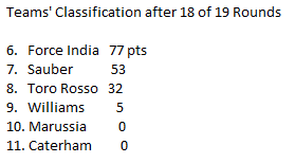Among the many rule changes for the 2014 F1 season is the decision to award double points for the final race of the 19 round championship. The idea, put forward in a response to Red Bull’s dominance over the last four years, is intended to give a greater chance for the driver’s championship to remain undecided heading into the final weekend in the hope of retaining TV audiences for the entire duration of the calendar.
The FIA have thrown a dart rather than attempting to find a credible solution but claim that the alteration to the points on offer for the final GP would “maximise focus on the championship until the end of the campaign”. Only three of the previous 20 championships would have had a different outcome had the double points rule been in force. One of Schumacher’s seven titles and one of Vettel’s four would have ended up going to another driver but hindsight doesn’t count in this scenario as the rules were the rules on those days in history.
By attempting to make the final race a prized commodity there are a number of unintended consequences and perverse incentives which may result.


The new engine and power-train rules are likely to cause a shakeup in the pecking order. Until the lights go out in Melbourne nobody will truly know where each team stands. This coupled with the certainty of engine reliability issues (some teams, Red Bull included, have voiced concern over engine reliability across the entire season) means there is a strong chance that the wrong driver could win the championship from external circumstances arising
from the double points scenario during the final race.
It has not been a popular idea with the teams or most purists but for the upcoming F1 season the FIA’s dart will keep double top!
 RSS Feed
RSS Feed